Ever wondered how Google finds what you're looking for in milliseconds, sifting through billions of web pages? Or how your favorite e-commerce site shows you that perfect gadget almost instantly? The secret sauce behind this magic is something called database indexing. Let's dive in and understand this crucial concept.
What is Database Indexing?
Imagine you're in a colossal library with millions of books. You're hunting for a book on "The History of Pizza" (because why not?). Without any organization system, you'd be checking every single book right? Nightmare fuel! But thank goodness for library catalogues that point you straight to your cheesy target.
In the world of databases, indexing plays a similar role. It's like creating a super-efficient catalogue for your data. Instead of scanning every record when you need something specific, your database can zoom right in on what you're after.
How Does It Work?
Let's break it down with a nifty diagram:

Now, let's decode this diagram:
-
Without Index (The Slow Lane):
- Your query hits the database.
- The poor database has to scan the ENTIRE table. It's like checking every book in the library one by one.
- After an eternity (okay, maybe just seconds, but it feels like forever), you get your result.
-
With Index (The Express Lane):
- Your query arrives at the database.
- The database checks the index first (think library catalog).
- The index quickly points to the exact location in the table.
- Boom! You get your result faster than you can say "pepperoni"!
-
Database Structure:
- You've got your main table where all the data lives.
- The index is like a mini-table that knows where everything is in the main table.
- It's separate but connected, like having a map of your library.
Why Should You Care?
-
Speed Demon: Proper indexing can turn your queries from "snail mail" to "email" speeds. We're talking milliseconds instead of seconds or minutes!
-
Happy Users: Faster queries = happier users. Nobody likes staring at loading screens, right?
-
Server Siesta: Efficient queries mean your database server doesn't have to work as hard. It's like giving your hardworking server a mini-vacation with every query.
-
Scaling Smoothly: As your data grows, good indexing helps your database performance scale gracefully. It's like having a well-organized closet — adding more clothes doesn't mean it takes longer to find your favorite shirt.
A Real-World Example
Let's say we're running an online bookstore. We have a table with millions of books. Here's how searching for "The History of Pizza" might look:
SELECT * FROM books WHERE title = 'The History of Pizza'; -- This scans ALL books. Slow!
With Index on the 'title' column:
CREATE INDEX idx_title ON books(title); -- Now searching is lightning fast!
The Catch (Because There's Always a Catch)
Indexing isn't all rainbows and unicorns. Here's the deal:
-
Storage Space: Indexes take up extra space. It's like having both your clothes and a separate list of all your clothes.
-
Slower Writes: When you add or update data, the database also needs to update the indexes. It's a bit more work upfront.
-
Choose Wisely: Not every column needs an index. Over-indexing can actually slow things down. It's about finding that Goldilocks zone — just right!
Wrapping Up: The Power of Smart Organization
Database indexing is like having a super-organized friend help you arrange your stuff. Sure, it takes a bit of extra effort to set up, but once it's in place, finding what you need becomes a breeze.
It's not just about making your queries faster — it's about creating efficient, scalable systems that can handle the demands of modern applications.
So next time you're working with a database and things seem a bit sluggish, remember the magic of indexing. It might just be the secret sauce your project needs to go from "meh" to "wow"!



